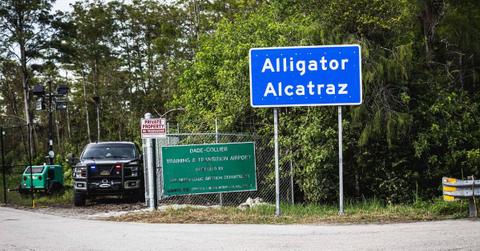A Judge Has Ordered the Closure of "Alligator Alcatraz," Leaving Florida on the Hook
Gov. Ron DeSantis's administration is planning to open a second facility and call it a "Deportation Depot."
Published Aug. 29 2025, 2:53 p.m. ET

As part of the Trump administration's broader efforts to deport millions of people, they have started opening prison camps in various corners of the country. The first of those camps, which was built in the Florida Everglades, has come to be known as Alligator Alcatraz, and it seems to be closing its doors just months after it was opened.
Following the news that the prison camp was closing, many naturally wondered why it was shutting down so shortly after it had opened. Here's what we know.

Why did Alligator Alcatraz close?
The reason that Alligator Alcatraz is winding down operations is that it has been ordered to do so by U.S. District Judge Kathleen Williams, according to The Associated Press.
On Aug. 27, she denied requests to pause her order, shutting down the facility. Her ruling sided with environmental groups, and the Miccosukee Tribe didn’t follow federal law requiring an environmental review for the detention center in the middle of sensitive wetlands.
The judge added that the number of detainees at the facility was already dwindling, and that “immigration enforcement goals will not be thwarted by a pause in operations.
The Department of Homeland Security has argued that closing the facility would, in fact, disrupt immigration enforcement, and also refused to say how many detainees remained at the facility following the judge's first injunction.

“DHS is complying with this order and moving detainees to other facilities,” a statement from DHS said. Even as activities at Alligator Alcatraz are winding down, though, reports suggest that Gov. Ron DeSantis's administration is planning to open a second facility in northern Florida and call it a "Deportation Depot."
In addition to the environmental challenges, Alligator Alcatraz has also faced lawsuits from civil rights groups who argue that detainees were denied access to the legal system.
Florida could be on the hook for the costs of the facility.
Now that the facility is set to close after just a few months of operation, The Associated Press is also reporting that Florida could be on the hook for more than $200 million related to the costs of building and maintaining the facility.
Reporting suggests that the state spent $218 million to turn what used to be a remote airport in the Everglades into a detention facility, and may now have to foot the bill for those costs.
The news that Alligator Alcatraz is closing may come as a surprise to many conservatives who saw the facility as a template for what other states could do to help the federal government with its goal of detaining and deporting illegal immigrants.
Reports from inside the facility suggest that there were potential human rights violations occurring on the premises.
Still, it seems Florida and other states are moving forward with plans for similar camps in spite of the successful challenge to Alligator Alcatraz. This initial experiment might not have been a success, but it seems Republicans are not willing to throw the baby out with the bathwater.